#Xenophon
Text


97 notes
·
View notes
Text

#philosophy#meme#philosophy memes#philosophy meme#memes#shitpost#philosophy shitpost#philosophy humor#humor#plato#socrates#aristotle#ancient greece#greek philosophy#Xenophon
164 notes
·
View notes
Text
Saw a great post floating around about medieval dog names that reminded me of the Cynegeticus (”on hunting”) by the philosopher Xenophon where he gives a delightful list suggestions for of dog names, so i compiled some of my favourites here
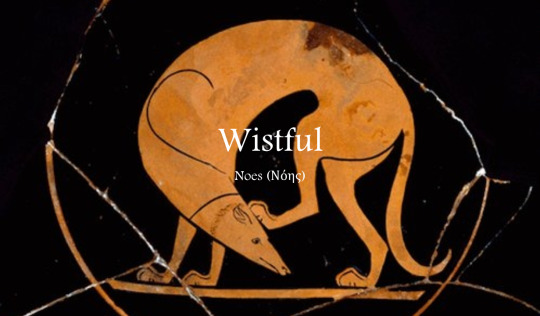
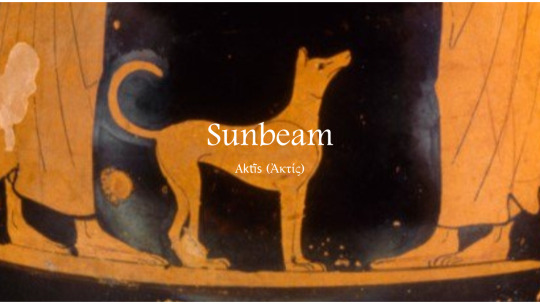
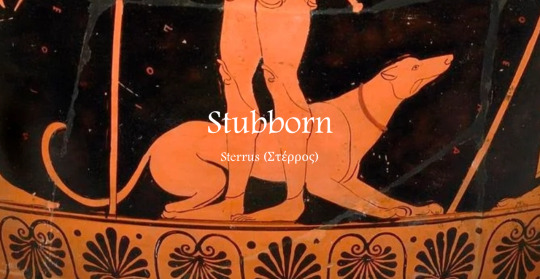

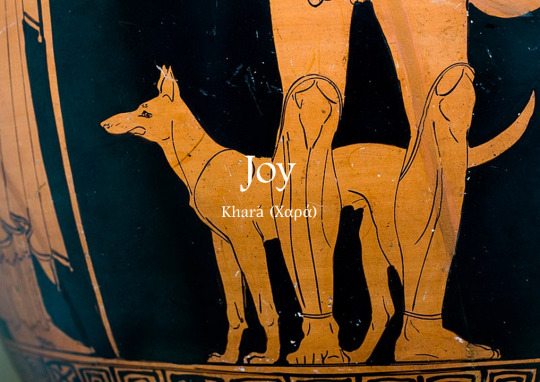

#History#dogs#dog names#xenophon#cynegeticus#this was mostly an excuse for me to post my favourite name STRONGBOY#(which admittedly is a bit of a liberal translation but it is so good)#ancient greece#long post
249 notes
·
View notes
Text
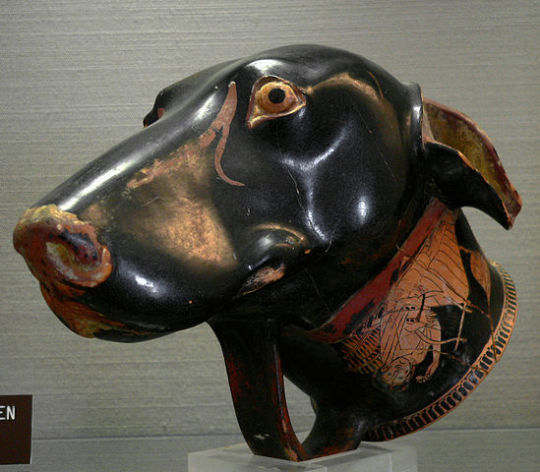
Some Pet Dog Names from Ancient Greece
When the hound has caught the hare, or been otherwise victorious in the course, you should […] pat him with your hand and praise him, kissing his head, and stroking his ears, and speaking to him by name […] for, like men of generous spirit, they love to be praised; and the dog, if not quite tired out [from the hunt] will come up with joy to caress you. (Arrian, On Coursing, XVIII Pg 116 trans. William Dansey)
As many dogs were hunting hounds or guard dogs in Ancient Greece, it followed that the naming convention was dependant on psychology; to name the dog something strong or skilful was to boast of the animals’ superiority to others of its breed, just as it reflected on the owner. There are some well known dogs in Ancient Greek history that many are aware of, namely Cerberus, Odysseus’ faithful dog Argos, and Alexander the Great named a city after his dog Peritas. We are lucky to have two lists of excellent dog names from authors Xenophon and Ovid.
From Xenophon (~ 430 - 355 BC), in his treaties on Hunting, we have the below list:
Give the hounds short names, so as to be able to call to them easily. The following are the right sort: Psyche, Thymus, Porpax, Styrax, Lonchê (Lance), Lochus, Phrura, Phylax (Sentinel/Guardian), Taxis, Xiphon, Phonax, Phlegon, Alcê (Stout), Teuchon, Hyleus, Medas (Crafty), Porthon, Sperchon (Bustler/Hasty), Orgê, Bremon, Hybris, Thallon (Vigorous), Rhomê, Antheus (Blossom), Hebe, Getheus, Chara (Jolly/Ecstasy), Leusson, Augo (Bright), Polys, Bia, Stichon, Spudê, Bryas, Oenas (Blueskin), Sterrus, Craugê, Caenon, Tyrbas, Sthenon, Aether, Actis, Aechmê, Noes (Counsellor), Gnomê, Stibon, Hormê (Impetus). (Xenophon Kynegetikos On Hunting 7.5)
A kind person on Reddit suggested these names could also translate as:
Psyche = Psyche / Spirit
Thymus = Pluck
Porpax = Buckler
Styrax = Spigot
Lonche = Lance
Lochus = Lurcher
Phrura = Watch
Phylax = Keeper
Taxis = Brigade
Xiphon = Fencer
Phonax = Butcher
Phlegon = Blazer
Alce = Prowess
Teuchon = Craftsman
Hyleus = Foster
Medas = Counsellor
Porthon = Spoiler
Sperchon = Hurry
Orge = Fury
Bremon = Growler
Hybris = Riot / Insolence
Thallon = Bloomer
Rhome = Rome / Mighty
Antheus = Blossom
Hebe = Hebe / Youth (Young’n)
Getheus = Hilary / Happy
Chara = Jollity
Leusson = Glazer
Augo = Eyesbright
Polys = Much
Bia = Force
Stichon = Trooper
Spude = Bustle
Bryas = Bubbler
Oenas = Rockdove
Sterrus = Stubborn
Crauge = Yelp
Caenon = Killer
Tyrbas = Strongboy / Riot
Sthenon = Sky
Aether = Sunbeam
Actis = Bodkin
Aechme = Wistful
Noes = Gnome
And from Ovid (~ 43 BC - 17 AD), in his Metamorphosis, of the dogs that attacked their master Actaeon, we have:
First ‘Black-foot’, Melampus, and keen-scented Ichnobates, ‘Tracker’, signal him with baying, Ichnobates out of Crete, Melampus, Sparta. Then others rush at him swift as the wind, ‘Greedy’, Pamphagus, Dorceus, ‘Gazelle’, Oribasos, ‘Mountaineer’, all out of Arcadia: powerful ‘Deerslayer’, Nebrophonos, savage Theron, ‘Whirlwind’, and Laelape, ‘Hunter’. Then swift-footed Pterelas, ‘Wings’, and trail-scenting Agre, ‘Chaser’, fierce Hylaeus, ‘Woody’, lately gored by a boar, the wolf-born Nape, ‘Valley’, Poemenis, the trusty ‘Shepherd’, and Harpyia, ‘Snatcher’, with her two pups. There is thin-flanked Sicyonian Ladon, ‘Catcher’, Dromas, ‘Runner’, ‘Grinder’, Canache, Sticte ‘Spot’, Tigris ‘Tigress’, Alce, ‘Strong’, and white-haired Leucon, ‘Whitey’, and black-haired Asbolus, ‘Soot’. Lacon, ‘Spartan’, follows them, a dog well known for his strength, and strong-running Aëllo, ‘Storm’. Then Thoos, ‘Swift’, and speedy Lycisce, ‘Wolf’, with her brother Cyprius ‘Cyprian’. Next ‘Grasper’, Harpalos, with a distinguishing mark of white, in the centre of his black forehead, ‘Black’, Melaneus, and Lachne, ‘Shaggy’, with hairy pelt, Labros, ‘Fury’, and Argiodus, ‘White-tooth’, born of a Cretan sire and Spartan dam, keen-voiced Hylactor, ‘Barker’ […] First ‘Black-hair’, Melanchaetes, wounds his back, then ‘Killer’, Theridamas, and Oresitrophos, the ‘Climber’, clings to his shoulder. (Ovid Metamorphoses III 206-233 trans. A S Kline)
Theoi has Brookes More’s translation which offers a few English variations on the names.
A few fun ideas to keep in mind if looking to name a new pet in Ancient Greek style.
For I have myself bred up a hound whose eyes are the greyest of grey; a swift, hard-working, courageous, sound-footed dog[…]. He is most gentle, and kindly-affectioned […] as soon as he catches sight of me, showing symptoms of joy, and again trotting on before me. […] He is the constant companion of whichever may be sick; and if he has not seen either of us for only a short time, he jumps up repeatedly by way of salutation, and barks with joy as a greeting. (Arrian, On Coursing, V Pg 78-80 trans. William Dansey)
🐶 Sources
Xenophon Kynegetikos
Arrian On Coursing
Ovid Metamorphoses III
Dog shaped Rhyton by the Brygos Painter in Aleria
64 notes
·
View notes
Text
need you all to know about Agelisaus' sister Puppy, who deserved better than the mention Xenophon gave her
He enhanced his own estate with the kinds of artefacts and possessions you might expect a man to own – that is, he kept a large number of hunting dogs and war-horses – but at the same time he also persuaded his sister Cynisca to breed a team of horses for chariot-racing and so, when she won a victory at the games, he proved that to keep such a team is not a mark of manly virtue but merely of wealth.*
*footnote: of wealth: Cynisca (‘Puppy’) was probably Agesilaus’ full sister. Xenophon significantly under-reports her achievement: in 396, she was the first woman ever to win the four-horse chariot-race at Olympia, and moreover won it again at the next games of 392. Pausanias 3.15.1, 5.111.5 (Penguin Guide to Greece, vol. 2, pp. 50, 231–2) mentions her commemorative dedication at Olympia and the hero-shrine to her at Sparta.
from Hiero The Tyrant And Other Treatises by Xenophon, translated by Robin Waterfield.
35 notes
·
View notes
Text
^_^
credits:
song + dance: すみっコディスコ by perfume
(https://www.youtube.com/watch?v=BwJvzz216D8)
motion: nario
(https://youtu.be/JEPm8AtMxnM?si=KWeXibvNNSCdWwvZ)
stage: Ai_3D素材
#alien food#kozmo#xenophon#xina#mmd#vid#see i said i'd do smth w them since last year i didn't forget#also tumblr keeps endlessly loading vid uploads n then auto sending them to drafts wtf
8 notes
·
View notes
Text
10000 HIT POINTS OF PSYCHIC DAMAGE 🙈

#I really did not need to know this about#Xenophon#but now I do you can too#this is from an academic article#Populat Perceptions of Elite Homosexuality in Classical Athens#by TK Hubbard#on Jstor#*popular
26 notes
·
View notes
Text
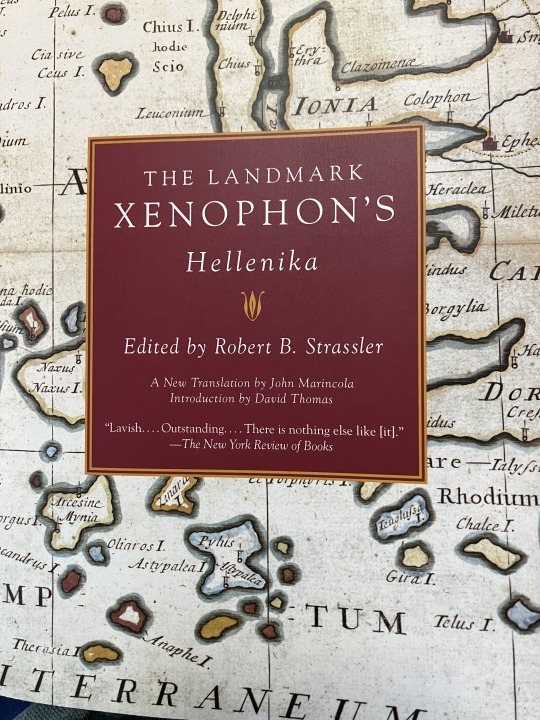
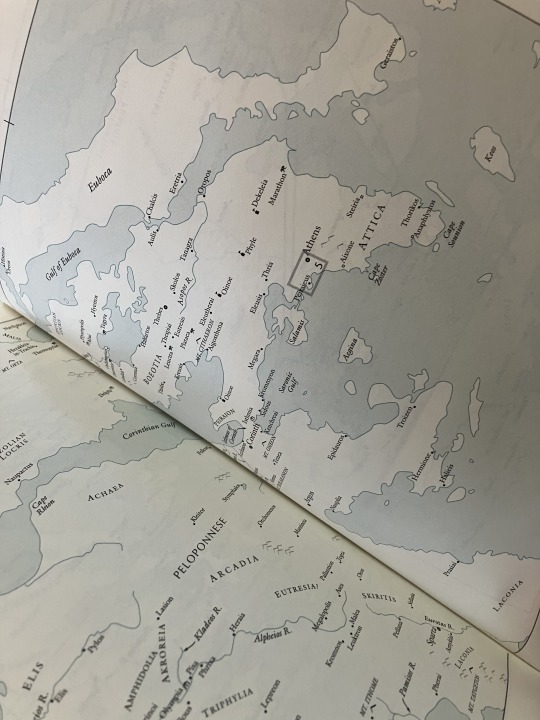

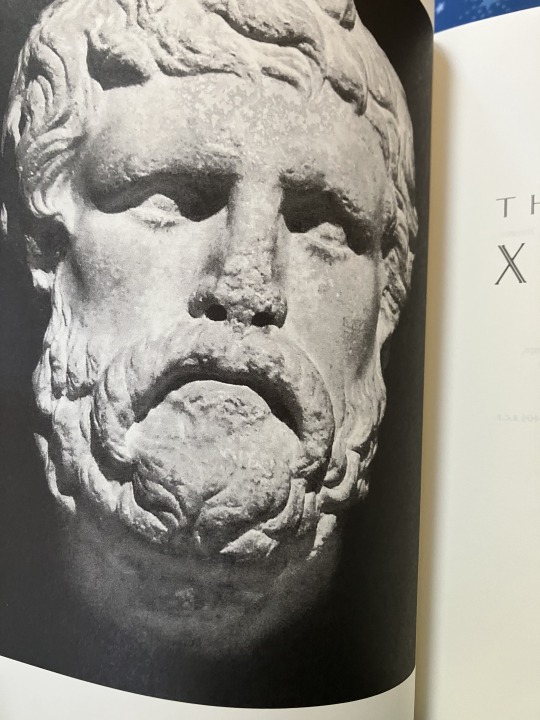
I NOW HAVE THE MOST EXCITING HISTORY BOOK I HAVE EVER SEEN
12 notes
·
View notes
Text

"Ce ne sont pas seulement, à mon avis, les actions sérieuses des hommes distingués qui sont dignes de mémoire, mais aussi leurs divertissements."
Xénophon, Banquet, trad. François Ollier, IVe siècle av J.-C.
6 notes
·
View notes
Text

Behold the niche-ness of my meme
25 notes
·
View notes
Text

#xenophon#edit#manip#steve rogers#tony stark#marvel cinematic universe#mcu#mcu phase 1#chris evans#robert downey jr#throwback
63 notes
·
View notes
Text
Archaic/Classical Greek Authors and Whether I Could Win Against Them in a Fight (Part 1)
Homer: This one depends on how I interpret the question. Homer as he’s thought of in the classical world? Absolutely I could take on a (probably fictional) old blind poet. Homer as in all the people who likely had a role in constructing The Iliad and The Odyssey? I do not stand a chance against that mob.
Hesiod: Oh yeah no problem. I’ll just, like, flutter my eyelashes or throw a bucket of bath water at him and he’ll run away screaming like the woman-fearer he is.
Sappho: Yes I could win against her in a fight, but why would I want to? I don’t have any beef with Sappho. I’d much rather befriend her.
Herodotus: This one’s going to be close, you guys. On the one hand, as a man in Classical Greece he has military training. On the other hand, I have a more balanced diet and most importantly, rage on my side. I think ultimately, his greater experience in combat will tip the scales.
Thucydides: Fuck no. That man fought a war against Sparta and survived. He caught the Plague of Athens and lived to tell the tale. His Greek sentences alone make me want to die. He would squash me like a bug.
Xenophon: Ah, Xenophon, nobody’s favourite author. Again, he has a ton of military experience. Could kill me easily. What an underwhelming end, to be killed by Xenophon of all people.
#i’m aroace but feel free to replace “befriend” with “kiss” in the sappho entry#gonna do a part 2 with the philosophers and playwrites later#spoiler alert: i’m befriending euripides#apologies to any xenophon fans out there. i’m just teasing him i promise#classics#tagamemnon#homer#hesiod#sappho#herodotus#thucydides#xenophon#original post#shitpost#esmer says things
66 notes
·
View notes
Text
Xenophon, Memorabilia of Socrates 31
Socrates had two ways of dealing with the difficulties of his friends: where ignorance was the cause, he tried to meet the trouble by a dose of common sense; or where want and poverty were to blame, by lessoning them that they should assist one another according to their ability.
And here I may mention certain incidents which occurred within my own knowledge. How, for instance, he chanced upon Aristarchus wearing the look of one who suffered from a fit of the "sullens," and thus accosted him.
Socrates: "You seem to have some trouble on your mind, Aristarchus; if so, you should share it with your friends. Perhaps together we might lighten the weight of it a little."
Aristarchus answered: "Yes, Socrates, I am in sore straits indeed. Ever since the party strife declared itself in the city, what with the rush of people to Piraeus, and the wholesale banishments, I have been fairly at the mercy of my poor deserted female relatives. Sisters, nieces, cousins, they have all come flocking to me for protection. I have fourteen freeborn souls, I tell you, under my single roof, and how are we to live?
"We can get nothing out of the soil—that is in the hands of the enemy; nothing from my house property, for there is scarcely a living soul left in the city; my furniture? no one will buy it; money? there is none to be borrowed—you would have a better chance to find it by looking for it on the road than to borrow it from a banker.
"Yes, Socrates, to stand by and see one's relatives die of hunger is hard indeed, and yet to feed so many at such a pinch impossible."
After he listened to the story, Socrates asked: "How comes it that Ceramon, with so many mouths to feed, not only contrives to furnish himself and them with the necessaries of life, but to realize a handsome surplus, whilst you being in like plight are afraid you will one and all perish of starvation for want of the necessaries of life?"
Aristarchus: "Why, bless your soul, do you not see he has only slaves and I have freeborn souls to feed?"
Socrates: "And which should you say were the better human beings, the freeborn members of your household or Ceramon's slaves?"
Aristarchus: "The free souls under my roof without a doubt."
Socrates: "Is it not a shame, then, that he with his baser folk to back him should be in easy circumstances, while you and your far superior household are in difficulties?"
Aristarchus: "To be sure it is, when he has only a set of handicraftsmen to feed, and I my liberally-educated household."
Socrates: "What is a handicraftsman? Does not the term apply to all who can make any sort of useful product or commodity?"
Aristarchus: "Certainly."
Socrates: "Barley meal is a useful product, is it not?"
Aristarchus: "Preeminently so."
Socrates: "And loaves of bread?"
Aristarchus: "No less."
Socrates: "Well, and what do you say to cloaks for men and for women—tunics, mantles, vests?"
Aristarchus: "Yes, they are all highly useful commodities."
Socrates: "Then your household do not know how to make any of these?"
Aristarchus: "On the contrary, I believe they can make them all."
Socrates: "Then you are not aware that by means of the manufacture of one of these alone—his barley meal store—Nausicydes not only maintains himself and his domestics, but many pigs and cattle besides, and realizes such large profits that he frequently contributes to the state benevolences; while there is Cyrebus, again, who, out of a bread factory, more than maintains the whole of his establishment, and lives in the lap of luxury; and Demeas of Collytus gets a livelihood out of a cloak business, and Menon as a mantua-maker, and so, again, more than half the Megarians by the making of vests."
Aristarchus: "Bless me, yes! They have got a set of barbarian fellows, whom they purchase and keep, to manufacture by forced labor whatever takes their fancy. My kinswomen, I need not tell you, are freeborn ladies."
Socrates: "Then, on the ground that they are freeborn and your kinswomen, you think that they ought to do nothing but eat and sleep? Or is it your opinion that people who live in this way—I speak of freeborn people in general—lead happier lives, and are more to be congratulated, than those who give their time and attention to such useful arts of life as they are skilled in?
"Is this what you see in the world, that for the purpose of learning what it is well to know, and of recollecting the lessons taught, or with a view to health and strength of body, or for the sake of acquiring and preserving all that gives life its charm, idleness and inattention are found to be helpful, whilst work and study are simply a dead loss?
"Pray, when those relatives of yours were taught what you tell me they know, did they learn it as barren information which they would never turn to practical account, or, on the contrary, as something with which they were to be seriously concerned some day, and from which they were to reap advantage? Do human beings in general attain to well-tempered manhood by a course of idling, or by carefully attending to what will be of use? Which will help a man the more to grow in justice and uprightness, to be up and doing, or to sit with folded hands revolving the ways and means of existence?
"As things now stand, if I am not mistaken, there is no love lost between you. You cannot help feeling that they are costly to you, and they must see that you find them a burden? This is a perilous state of affairs, in which hatred and bitterness have every prospect of increasing, whilst the preexisting bond of affection is likely to be snapped.
"But now, if only you allow them free scope for their energies, when you come to see how useful they can be, you will grow quite fond of them, and they, when they perceive that they can please you, will cling to their benefactor warmly.
"Thus, with the memory of former kindnesses made sweeter, you will increase the grace which flows from kindnesses tenfold; you will in consequence be knit in closer bonds of love and domesticity. If, indeed, they were called upon to do any shameful work, let them choose death rather than that; but now they know, it would seem, the very arts and accomplishments which are regarded as the loveliest and the most suitable for women; and the things which we know, any of us, are just those which we can best perform, that is to say, with ease and expedition; it is a joy to do them, and the result is beautiful.
"Do not hesitate, then, to initiate your friends in what will bring advantage to them and you alike; probably they will gladly respond to your summons."
"Well, upon my word," Aristarchus answered, "I like so well what you say, Socrates, that though hitherto I have not been disposed to borrow, knowing that when I had spent what I got I should not be in a condition to repay, I think I can now bring myself to do so in order to raise a fund for these works."
Thereupon a capital was provided; wools were purchased; the good man's relatives set to work, and even whilst they breakfasted they worked, and on and on till work was ended and they supped.
Smiles took the place of frowns; they no longer looked askance with suspicion, but full into each other's eyes with happiness. They loved their kinsman for his kindness to them. He became attached to them as helpmates; and the end of it all was, he came to Socrates and told him with delight how matters fared; "and now," he added, "they tax me with being the only drone in the house, who sit and eat the bread of idleness."
To which Socrates: "Why do not you tell them the fable of the dog? Once on a time, so goes the story, when beasts could speak, the sheep said to her master, 'What a marvel is this, master, that to us, your own sheep, who provide you with fleeces and lambs and cheese, you give nothing, save only what we may nibble off earth's bosom; but with this dog of yours, who provides you with nothing of the sort, you share the very meat out of your mouth.'
"When the dog heard these words, he answered promptly, 'Ay, in good sooth, for is it not I who keep you safe and sound, you sheep, so that you are not stolen by man nor harried by wolves; since, if I did not keep watch over you, you would not be able so much as to graze afield, fearing to be destroyed.'
"And so, says the tale, the sheep had to admit that the dog was rightly preferred to themselves in honor. And so do you tell your flock yonder that like the dog in the fable you are their guardian and overseer, and it is thanks to you that they are protected from evil and evildoers, so that they work their work and live their lives in blissful security."
—from Xenophon, Memorabilia 2.7
IMAGE: Anton Mauve, Shepherd and Sheep (c. 1880)
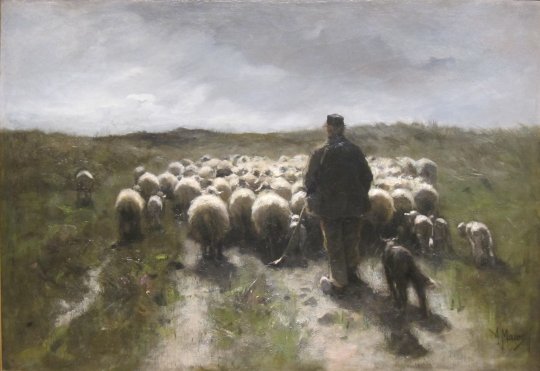
3 notes
·
View notes
Note
URGENT! I'm getting a puppy soon. I wanna give it an ancient Roman name, because I know how much Romans loved them. What do I call him?!
Good news! In "On Hunting," Xenophon has left us a list of what he considers Valid Dog Names. The Romans often gave pets (and people) Greek nicknames, and would have likely used these, too:
Psyche, Pluck, Buckler, Spigot, Lance, Lurcher, Watch, Keeper, Brigade, Fencer, Butcher, Blazer, Prowess, Craftsman, Foster, Counselor, Spoiler, Hurry, Fury, Growler, Riot, Bloomer, Rome, Blossom, Hebe, Hilary, Jollity, Glazer, Eyebright, Much, Force, Trooper, Bustle, Buckler, Pigeon, Stubborn, Yelp, Killer, Strong Boy, Sky, Sunbeam, Bodkin, Wistful, Gnome, Tracks, Dash
Or, in Greek:
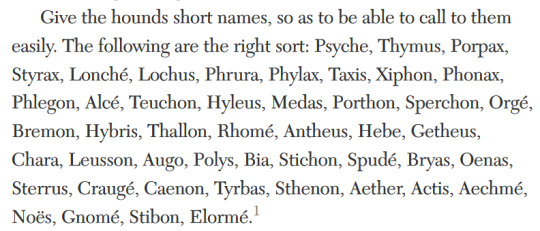
The Romans also liked to nickname their kids after places they'd just conquered or pacified, e.g. Germanicus. I suppose the modern equivalent would be naming a dog after something you kick ass at doing!
Edit: Found another article with even more dog names!
#there's a great bit in masters of rome where the bithynians keep naming their tiny cranky dogs after roman generals#sulla and lucullus would be so mad if they found out lol#the-little-fox-in-the-box#roman names#dogs#just roman asks#xenophon#translation from historia civilis
11 notes
·
View notes
Text
barf re: the obvious but aside from that... this guy lol. with his male model division. 😭
There was in the army a man from Olynthus called Episthenes who was attracted to boys. He noticed that a good-looking boy, carrying a light shield, who had just reached the period of bloom, was about to be put to death, and he ran over to Xenophon and begged him to rescue the beautiful boy. Xenophon went up to Seuthes and asked him to spare the boy’s life; he explained Episthenes’ character and told him how he had served with distinction in a military unit he had formed, the sole criterion for entry into which was the attractiveness of the men.
‘Would you really be willing to die for this boy’s sake, Episthenes?’
asked Seuthes. Episthenes exposed his neck and said: ‘Strike, if the boy tells you to. Anything to make him happy.’
Seuthes asked the boy if he should execute Episthenes instead of him, but the boy said no and begged him to kill neither of them. Then Episthenes embraced the boy and said: ‘Seuthes, you’ll have to fight me for him, because I’m not going to let him go.’
Seuthes laughed and let the matter drop.
(Xenophon's The Expedition of Cyrus, translator Tim Rood).
#xenophon#*the obvious being the pedophilia. just reached period of bloom is what. i think 14? pre facial hair idk. ancient greeks :/
17 notes
·
View notes
Photo
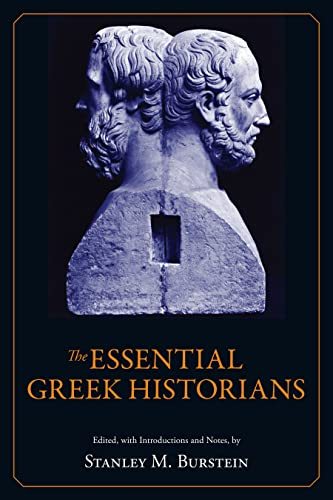
The Essential Greek Historians
In his introduction to The Essential Greek Historians, an important distinction is made by the editor Stanley M. Burstein: what follows in this book is not "history" but "historiography." History is made up of events and consequences, an assemblage of facts and dates recorded for posterity, while historiography is what we do with those details when we gather them up and write them down. In other words, historiography is the kind of story we expect when we open a book today. But The Essential Greek Historians’s chief goal is not to retell ancient yarns for a modern readership looking for a leisure read at the beach. It is a scholarly work ultimately suitable for the classroom and those looking to study the words written by Western civilization’s early chroniclers.
It is a scholarly work ultimately suitable for the classroom and those looking to study the words written by Western civilization’s early chroniclers.
That makes this 200-page compendium alternately exciting, transporting, arcane, and dull, depending on both the author's and the reader's interest. If the reader's wish is to know their Xenophon from their Polybius or their Aristotle from their Memnon, and how they approached the events around them, then this book is a perfect place to begin.
Continue reading...
29 notes
·
View notes